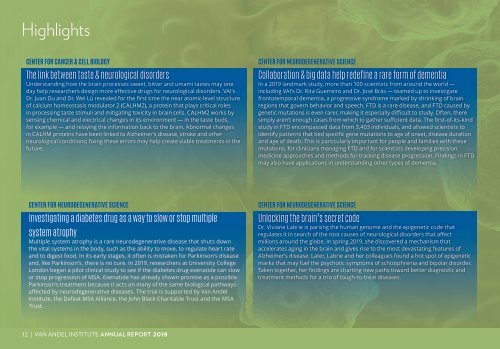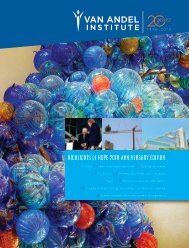2019 Annual Report
You also want an ePaper? Increase the reach of your titles
YUMPU automatically turns print PDFs into web optimized ePapers that Google loves.
Highlights<br />
CENTER FOR CANCER & CELL BIOLOGY<br />
The link between taste & neurological disorders<br />
Understanding how the brain processes sweet, bitter and umami tastes may one<br />
day help researchers design more effective drugs for neurological disorders. VAI’s<br />
Dr. Juan Du and Dr. Wei Lü revealed for the first time the near atomic-level structure<br />
of calcium homeostasis modulator 2 (CALHM2), a protein that plays critical roles<br />
in processing taste stimuli and mitigating toxicity in brain cells. CALHM2 works by<br />
sensing chemical and electrical changes in its environment — in the taste buds,<br />
for example — and relaying the information back to the brain. Abnormal changes<br />
in CALHM proteins have been linked to Alzheimer’s disease, stroke and other<br />
neurological conditions; fixing these errors may help create viable treatments in the<br />
future.<br />
CENTER FOR NEURODEGENERATIVE SCIENCE<br />
Collaboration & big data help redefine a rare form of dementia<br />
In a <strong>2019</strong> landmark study, more than 100 scientists from around the world —<br />
including VAI’s Dr. Rita Guerreiro and Dr. José Brás — teamed up to investigate<br />
frontotemporal dementia, a progressive syndrome marked by shrinking of brain<br />
regions that govern behavior and speech. FTD is a rare disease, and FTD caused by<br />
genetic mutations is even rarer, making it especially difficult to study. Often, there<br />
simply aren’t enough cases from which to gather sufficient data. The first-of-its-kind<br />
study in FTD encompassed data from 3,403 individuals, and allowed scientists to<br />
identify patterns that tied specific gene mutations to age of onset, disease duration<br />
and age of death. This is particularly important for people and families with these<br />
mutations, for clinicians managing FTD and for scientists developing precision<br />
medicine approaches and methods for tracking disease progression. Findings in FTD<br />
may also have applications in understanding other types of dementia.<br />
CENTER FOR NEURODEGENERATIVE SCIENCE<br />
Investigating a diabetes drug as a way to slow or stop multiple<br />
system atrophy<br />
Multiple system atrophy is a rare neurodegenerative disease that shuts down<br />
the vital systems in the body, such as the ability to move, to regulate heart rate<br />
and to digest food. In its early stages, it often is mistaken for Parkinson’s disease<br />
and, like Parkinson’s, there is no cure. In <strong>2019</strong>, researchers at University College<br />
London began a pilot clinical study to see if the diabetes drug exenatide can slow<br />
or stop progression of MSA. Exenatide has already shown promise as a possible<br />
Parkinson’s treatment because it acts on many of the same biological pathways<br />
affected by neurodegenerative diseases. The trial is supported by Van Andel<br />
Institute, the Defeat MSA Alliance, the John Black Charitable Trust and the MSA<br />
Trust.<br />
CENTER FOR NEURODEGENERATIVE SCIENCE<br />
Unlocking the brain’s secret code<br />
Dr. Viviane Labrie is parsing the human genome and the epigenetic code that<br />
regulates it in search of the root causes of neurological disorders that affect<br />
millions around the globe. In spring <strong>2019</strong>, she discovered a mechanism that<br />
accelerates aging in the brain and gives rise to the most devastating features of<br />
Alzheimer’s disease. Later, Labrie and her colleagues found a hot spot of epigenetic<br />
marks that may fuel the psychotic symptoms of schizophrenia and bipolar disorder.<br />
Taken together, her findings are charting new paths toward better diagnostic and<br />
treatment methods for a trio of tough-to-treat diseases.<br />
12 | VAN ANDEL INSTITUTE ANNUAL REPORT <strong>2019</strong>
















